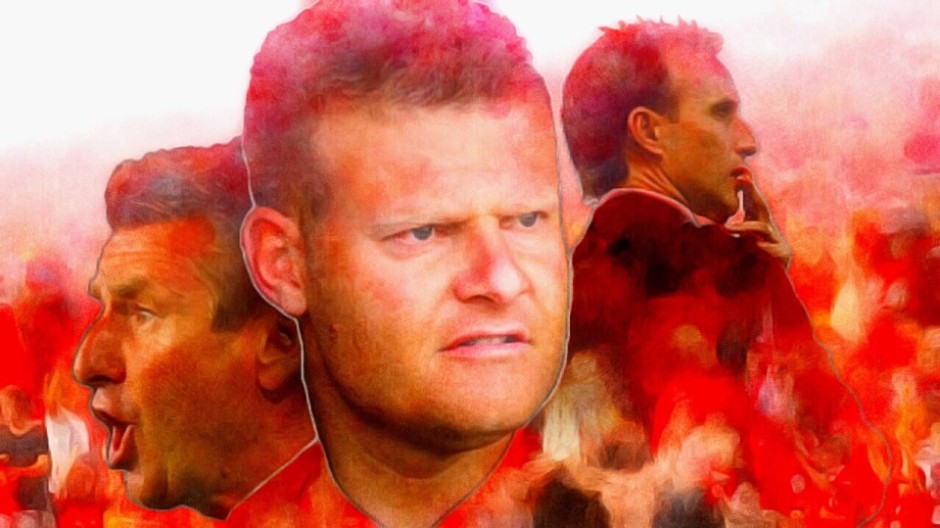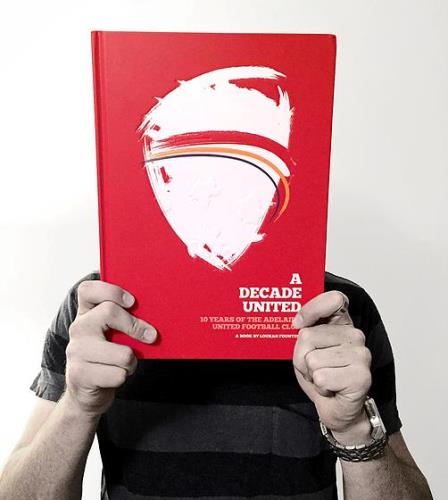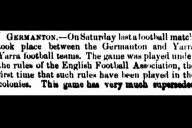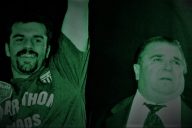It goes without saying that Adelaide United’s brief existence has been a tumultuous one. Reds fan and ABC reporter Loukas Founten has been there since the first game and has seen it all – the on-field implosions, the inaugural Premiership, the pissants rant, #Shitgoalkeepergate and the rebirth under Josep Gombau.
While juggling full-time work at the ABC – which included reporting and commentating on Reds games – getting married, playing football and training twice a week, Loukas chronicled the history of Adelaide United in his first book, A Decade United.
After shopping the book around to several publishers, Loukas was offered a publishing deal by one publisher with the proviso Adelaide United support the project by promising they would purchase at least 500 of the books once published. However, despite the enthusiasm shown for the project by many in the club, the official club response was lukewarm.
While Loukas says he was disappointed the club didn’t jump on board, he could understand their reservations.
“The club doesn’t have a lot of money to play with and there would have had to be some money outlaid, but I thought there would be a really good opportunity for them to make some money for themselves and promote the club’s own history without having to do a lot of work,” he says.
When the club knocked back his proposal, the publishing deal fell through. This is when Loukas pursued the path of crowd funding the book’s publication through Pozible.
Having already conducted a lot of the interviews and research for the book, he decided to stick to his guns and see the book through.
“I just had this belief that it was worth writing about, and I’d already done quite a bit of work by then, because publishers won’t accept anything less than three chapters. I’d just about written the whole book before I approached people,” he says.
“I think because I had that belief in myself and also these other people expressed a bit of belief as well, I thought: ‘I need to go on and carry through with this.’ And I wanted to stick it up people, and say ‘we did it anyway’.”
The task of bringing the book to fruition would take two years all up, during which time he managed to fit in working full-time as a journalist for the ABC, working ABC Grandstand on top of that, trying to play soccer (for Vipers FC) on the weekends and training, getting married, going to the World Cup in Brazil, and then trying to find time around that to write and do research.
With the book finished and now available for purchase following a successful crowdfunding campaign, Loukas spoke to Shoot Farken about why he decided to take on the task of writing and researching the history of Adelaide United, and what it takes to (self) publish an A-League club history.
Shoot Farken: Adelaide United is still quite new to the sporting landscape here in South Australia. What is it about this club that has driven you to write its history?
Loukas Founten: I think it’s a combination of being a fan and wanting to write a book. It was good timing because the club was heading into their tenth year at the time I was deciding to write this book.
It’s something I’ve always wanted to do, it’s something that interests me a lot and out of any A-League club it’s got a great story to tell. There’s so many highs and lows and ups and downs and controversies that need to be explained in a bit more detail, so I thought: ‘perfect opportunity, let’s do it!’
SF: Working for the ABC, you’ve obviously had a fair bit of experience reporting, writing and doing interviews, including with A-League players and coaches. How crucial do you think having this particular skill set was to the creation of this book?
LF: It did help, but I must say I learned a lot more in the first two or three months of trying to write this book than I did throughout uni and probably in seven or eight years at the ABC. It’s a different style of interviewing as well, because when you’re doing TV and radio, which is my primary job, you’re focusing on a grab, a short quote – 10 to 12 seconds, maybe 15 seconds.
I wanted people to really open up and share the full story, and delve back into their memories. So it was important to get people to speak more than just in grabs. Some people didn’t want to do that and you really had to massage them.
That was a real skill that I developed and the interviews got better as I went on, so I tried to leave some of the more important ones (until) towards the end because I knew that they’d have more to say.
The ABC teaches us to be impartial and try to be as objective as we can be. I think that was really crucial because people wanted to trust that I wasn’t going to turn things – I didn’t have an agenda when I was writing this book.
That helped – the interviewing, having the contacts, being at the ABC. It doesn’t mean that someone who wasn’t working at the ABC, or as a journo, couldn’t go and write a book of their own. I don’t believe that’s a necessity. Just having the belief, the passion and obviously the skill to do some writing and find people – all that research, that’s the key there.
SF: The club has copped a lot of criticism from the sporting public and the media in some of its darker moments over the 10 years. Having had the chance to peek behind the curtain, do you feel a bit more sympathetic to the people working behind the scenes during those times?
LF: I think so. They’re working really hard on a limited budget with limited resources. And they’re good people, working as hard as they can to get the best outcome for the club and the sport, and obviously the game in this state.
It’s a difficult one because the competition is young, the club is young, and it was a real revolution in a way, the changing of (the) sport with the A-League. People are doing their best and I do have a bit more sympathy for people.
You understand where people are coming from. Especially when it comes to players and coaches, they see themselves as Number 1. The people on the boards, they’re trying to do the right things by themselves and their families as well as the club and I think that’s something I have a bit more of an appreciation of having spoken to so many people now.
SF: You mentioned at the book launch that you had to leave a lot out of the book to avoid being sued. Without breaching any sort of confidentiality, what did some of this revolve around and what do any potential authors need to be wary of including in their own A-League club histories?
LF: There’s still a potential I could be sued, but hopefully not! (laughs) When it comes to Adelaide United, something I took away from writing this book is that the people I spoke to genuinely had a real affection for this club. They all had great memories and some really happy times there.
But equally, most of the people that I interviewed had left the club, and all had really sour tastes in their mouth. They were a bit bitter about how things ended.
A lot of people were bitter about decisions made about their careers and their futures and blamed certain individuals. When you’re attacking an individual rather than an entity, you’ve got to be really careful. A lot of blame and a lot of stories… it’s hard to prove them.
That goes into my background as a journalist and with the ABC. Unsubstantiated things that can be defamatory or can get people into trouble, there’s always an alarm bell that goes off and you know that you probably shouldn’t run that kind of thing! (laughs)
I did have a few lawyers read over some different passages that I was concerned about, so that was something that I can probably suggest to people – get things checked. It can be an expensive exercise, but if you know good people, make sure you use them.
A lot of it was to do with decisions made and people encroaching on different jobs where they probably didn’t need to. Might be a board member or an owner or a chairman who was getting involved in the playing side of things, or it might be a coach or a player that was trying to make calls that were things for off-field decisions that they weren’t really allowed to do, or shouldn’t have been involved with. Nothing all that damaging.
I think people would find things a bit juicy and a bit tabloid and that would really add a lot of interest, but I thought ‘play the safe route.’ I’m still a supporter of the club and you don’t want things to be too damaging of people who’ve put their time and money and everything else on the line.
You just have to be careful and that’s what I’ve tried to do, but without removing too much of the content. There still needs to be some stuff that’s interesting in there, and my main focus was finding things that made me go: ‘oh really? I didn’t know that.’ As someone who’s followed the club, if I did that, I figured other people would be the same. So I did have two or three friends that I ran things by as well, just in case I might have missed something – again, surround yourself with good people.
SF: Having had the chance to speak to people from different periods across the club’s history, do you get the sense that Adelaide United has really evolved over the 10 years? And do you feel that the original principles behind the formation of the club are still there?
LF: On the second point – no, I don’t. I think we’ve come away from the idea of ‘The People’s Club.’ The motto was removed from the logo and we don’t really hear too much about that. It was really set up to combine Federation clubs and the interests of football supporters in this state. These days it’s become more of a professional business where money is at the forefront of decision-making.
We’re starting to see more investment in the future, in nurturing young talent, academies, making sure that training venues are prepared and ready for the club. So they’re looking longer term now. And I think we needed to see that happen.
But over the years, I think the idea of keeping the community involved has been eroded just a little bit. And hopefully the people at the helm can see that and make those changes.
It’s been better in the last, maybe, 18 months, so we need to see that continue, in my opinion, for what little that it counts for. But having spoken to so many people and witnessed the change at the club over the years, I think that’s something that stuck with me, that the club has changed. Some things for the better, some things for the worse, but hopefully longer term we start to see some good outcomes.
SF: You were lucky enough to have inaugural squad member and current assistant coach Michael Valkanis speak at your book launch. What struck me is the passion he showed in that speech for being involved with the club.
A section of football fans in Australia look down on the A-League teams as being ‘plastic’ and ‘franchises,’ where the players just play for money rather than the love of the club. Do you think the Adelaide United story disproves that argument?
LF: Especially in the early days, yes. And Michael was – not only on the night of the book launch did he really show that passion but even when (I was) speaking to him. We sat and had a coffee in a café, and it ended up being a very, very long coffee because he went on for hours! He had so many great stories because he’s been there across the 10 years.
On the book launch night you could see him going back into his memory and you could see his eyes glistening and a smile coming through, and the love and the affection that he had for the club. And as I said earlier, it’s something that you could really feel from most people that I spoke to.
John Kosmina summed it up really well when he said he has a spot in his heart for the club, but not so much the people. People change but the club is the one constant. There are good people, and he likes certain people, but he doesn’t like many people! But he loves the club.
I think the idea of the plastic franchise was something that (emerged) because Adelaide, and probably to a lesser extent Perth Glory, were created on that premise of uniting people and not having the ethnic ties. But even from the first match you could see there were going to be big things.
And it wasn’t just plastic. It was created out of absolutely nothing but 10 years on, still there, still some amazing characters around the place. I think it’s fair to say that maybe the idea of the plastic franchise isn’t quite true. Maybe it has been disproved by Adelaide United. But maybe the changes that have been made and the way that things have become a bit more professional, that plastic element is there.
I do like that the club is going down the route of trying to recruit a lot of good, young South Australian players, bring them home or raise them through the junior ranks. And I think that is leading them back to the right path of making it ‘the people’s team’ for South Australia and maybe dispelling some of those myths and rumours about plastic franchises. Keep it South Australian.
SF: Besides the feeling of pride you get from getting it out there for people to read, what other positives have come from writing the book?
LF: So far, not a lot. It’s been great to (get) feedback from people telling me I’ve done a good job and thanking me. That’s the best thing.
It’s still early days so there could be further benefits down the track. I don’t know what I was chasing when I started writing the book. I don’t know if it was because I want to be involved in the game. I want to be known as someone who loves the game and knows the game – that was my main focus. If this helps, that’d be great.
If not, someone might pick up my book in 30 years’ time at an op shop for 20 cents and I’ll be happy that they’ve found a dusty old book with my name on it and put it on their shelf. That’s enough for me, to have that sense of pride. Put it on your CV and tell your grandkids about it – that’s all I’m really after to be honest!
Shoot Farken wishes to thank Jeff Vatuvei @AardigOranje for the digital illustration featuring Josep Gombau, John Kosmina & Aurelio Vidmar.
You can purchase your copy of Loukas Founten’s A Decade United here.


















Thanks for the article. I was already looking into purchasing the book & now having some background information on the author & the books’s content has confirmed that decision for me.